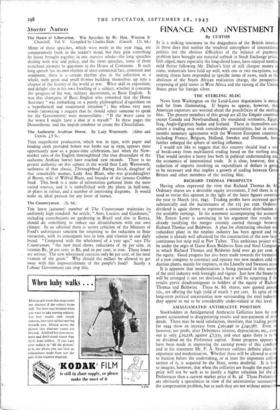FINANCE AND INVESTMENT
By CUSTOS
IT it a striking testimony to the doggedness of the British investo in these days that neither the troubled atmosphere of internation politics nor the obvious difficulties of the balance of payments problem have brought any material setback in Stock Exchange prices. Gilt edged, more especially the long-dated loans, have enjoyed another mild flutter following Mr. Dalton's hint of still cheaper money t come, industrials have held up well, with one or two exceptions, an mining shares have responded to specific items of news, such as the abolition of the South African realisation charge, the prospective reopening of gold mines in West Africa and the raising of the Unite States price for foreign silver.
THE STERLING BLOC
News from Washington on the Lend-Lease riegotiations is mite and far from illuminating. IC begins to appear, however, tha American exporters are worried about the possibilities of the sterlin bloc. The present members of this group are all the Empire countri except Canada and Newfoundland, the mandated territories, Egypt, Iraq, Anglo-Egyptian Sudan and Iceland. These in themselves con- stitute a trading area with considerable potentialities, but in recent months monetary agreements with the Western European countries including France, Belgium, Holland, Sweden and Denmark, hay further enlarged the sphere of sterling influence.
I would not like to suggest that this country should lead a sor of break-away from multilateral trading based on the sterling are That would involve a heavy loss both in political understanding an the economics of international trade. It is clear, however, that reduction of imports involving an expenditure of dollars is goin to be necessary and that implies a growth of trading between Grea Britain and other members of the sterling bloc.
RICHARD THOMAS PROSPECTS
Having often expressed the view that Richard Thomas Os. 8 Ordinary shares are a desirable equity investment, I feel there is n need to revise this opinion in the light of the latest figures coverin the year to March 31st, 1945. Trading profits have increased quit substantially and the maintenance of the 12+ per- cent. Ordinar dividend is again shown to represent a conservative distribution o the available earnings. In his statement accompanying the account Mr. Ernest Lever is convincing in his argument that results ar already justifying the merger recently carried through betwee Richard Thomas and Baldwins. A plan for eliminating obsolete an redundant 'plant in the tinplate industry has been *reed and th scheme is already well advanced for the construction of the new larg continuous hot strip mill at Port Talbot. This ambitious project w be under the aegis of Guest Keen Baldwins Iron and Steel Compan in which Richard Thomas and Baldwins hold over 4o per cent. the equity. Good progress has also been made towards the formatio of a new company to construct and operate two new modern cold r duction plants, mainly for tinplates, in the Lianelly and Swansea area It is apparent that modernisation is being pursued in this sectio of the steel industry with foresight and vigour. Just how the financin will be arranged is not yet disclosed, but it will be surprising if th results prove disadvantageous to holders of the equity of Richar Thomas and Baldwins. These 6s. 8d. shares, now quoted aroun 12s., are offering the high yield of nearly 7 per cent. In spite of th long-term political uncertainties now surrounding the steel industr they appear to me to be considerably under-valued at this level.
AMALGAMATED ANTHRACITE POSITION
Stockholders in Amalgamated Anthracite Collieries have by n grown accustomed to disappointing results and non-payment of div dends. There may be mild satisfaction, therefore, that trading profi for 1944 show an increase from £205,946 CO £240,387. Even s however, net profit, after Debenture interest, depreciation, etc., ca out at only £10,218, against £7,335, and once again there is to no dividend on the Preference capital. Some progress appears have been made in improving the earning power of this combin and in his statement Mr. F. A. Szarvasy outlines definite plans f expansion and modernisation. Whether these will be allowed to co to fruition before the undertaking, or at least the important collie section of it, is acquired by the State, seems doubtful. It is hat to imagine, however, that when the collieries are bought the purcha price will not be such as to justify a higher valuation for the £ Preferences than a current market price of 8s. 3d. These Preferenc are obviously a speculation in view of the uncertainties surroundin the compensation problem, but as such they are not without attracts°


























 Previous page
Previous page